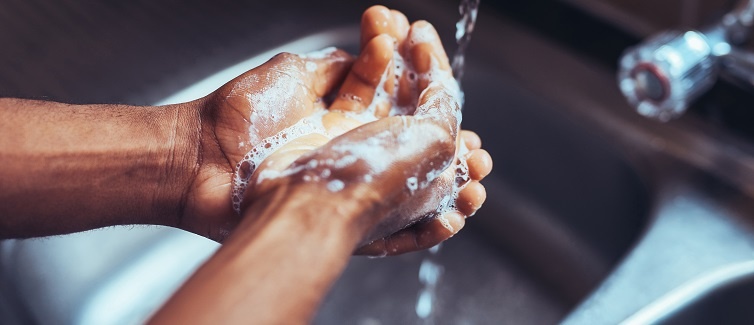Preventing the spread of disease can be as easy as A, B, C.
Using good hand hygiene can help prevent you and others from getting sick with respiratory and diarrheal illnesses. That includes the cold, flu, and COVID-19.
And one way you can practice good hygiene is by regularly washing your hands. Handwashing can remove germs to help you stay healthy.
Never Miss a Beat!
Subscribe for Updates and Information from UPMC
Thank you for subscribing!
You can now select the specific newsletters you'd like to receive.
You are already subscribed.
Subscribe to more newsletters in our email preference center.
Sorry, an error occurred. Please try again later.
Sign up for COVID-19 Alerts from UPMC
When Should I Wash My Hands?
There’s never a bad time for handwashing, but it’s especially important before, during, and after you do certain things. Remember to always wash your hands:
- Before and after treating a cut.
- Before, during, and after making food.
- Before eating.
- After coughing, sneezing, or blowing your nose.
- After changing a diaper or cleaning up a child who went to the bathroom.
- After going to the bathroom.
- After touching an animal, animal waste, or animal food.
- After touching common surfaces, such as tables, countertops, handles, and doorknobs.
- After touching garbage.
- While taking care of someone who is sick.
How Should I Wash My Hands?
The Centers for Disease Control and Prevention recommends washing your hands with soap and water for at least 20 seconds.
If soap and water are unavailable, you can use hand sanitizer. The CDC says the hand sanitizer you use should contain at least 60% alcohol.
To properly wash your hands:
- Wet your hands with clean running water. The water can be warm or cold.
- Apply soap to your hands and rub them together to lather the soap.
- Lather the back of your hands, between your fingers, and underneath your nails.
- Rub your hands for at least 20 seconds.
- Rinse your hands under clean water.
- Use a clean towel to dry your hands, or air dry them.
To use hand sanitizer, apply the gel to one of your palms and rub your hands together. Rub the gel all over your hands and fingers for at least 20 seconds, until your hands are dry.
If you want to make sure you wash your hands for 20 seconds, you can sing the “ABCs” or “Happy Birthday” twice.
Washing your hands according to the steps above may help prevent you from getting sick.
Editor's Note: This article was originally published on , and was last reviewed on .
About Infectious Diseases
If you have a disease caused by bacteria, fungi, parasite, or virus, the UPMC Center for Care of Infectious Diseases can help. Our team of experts is specially trained in the prevention and treatment of infectious diseases, including of HIV-AIDs, postsurgical and transplant infections, illnesses caused by international travel, and more. We research infectious diseases and participate in clinical trials to learn more and develop better treatment and prevention methods. Visit our website to find an expert near you.
